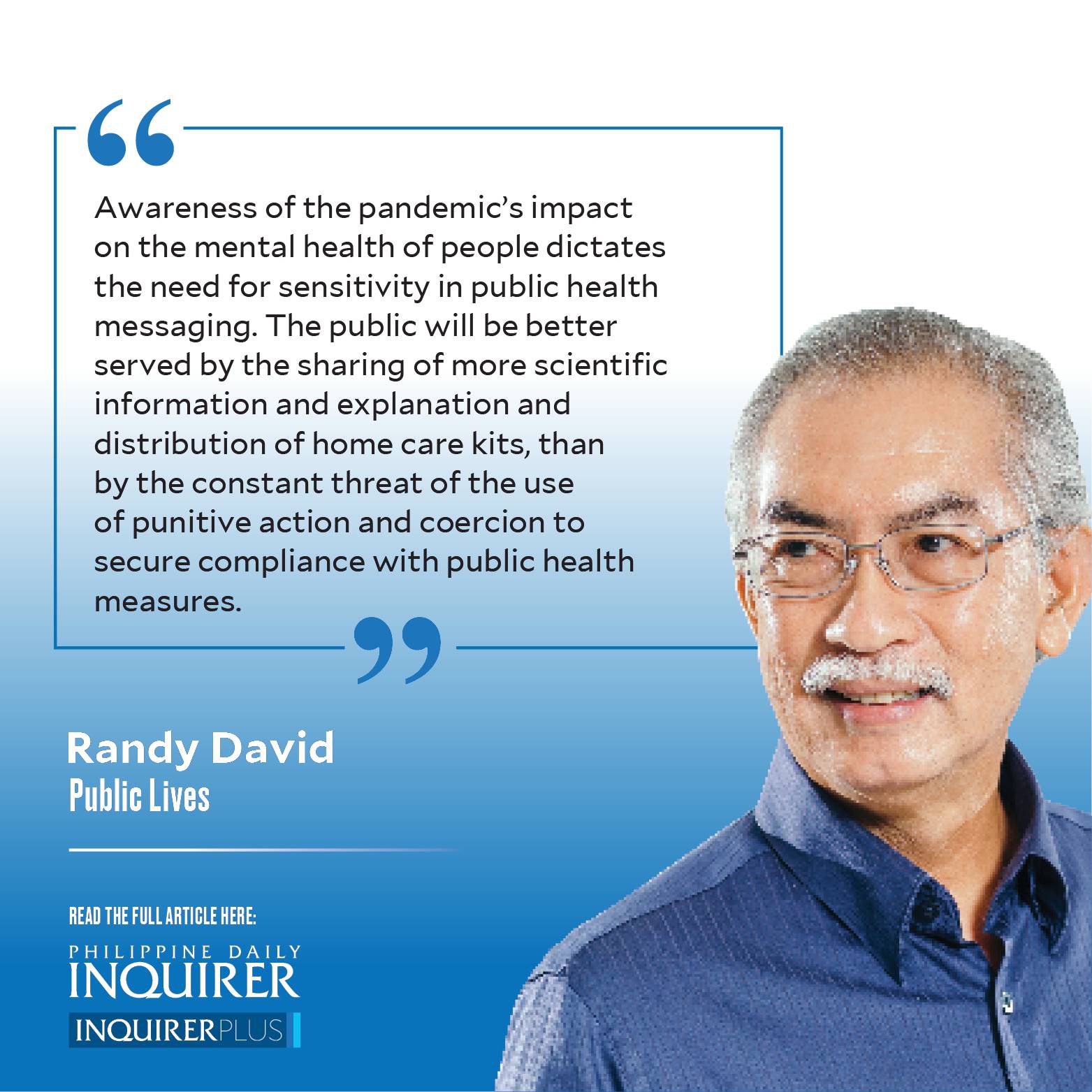COVID-19 stress syndrome
Before my brother Dante was intubated in October last year, he made two hurried calls from the emergency room. The first was to our brother Ambo, the priest, to ask for his blessing and prayers. The second was to me, the eldest of the David siblings, to let me know he had agreed to be intubated. Ten days later, he was gone—one of the casualties of COVID-19 in the final days of the deadly Delta surge.
His gasping voice on the phone was my last vivid memory of him. Over the holidays, at our ancestral home in Betis, I found myself staring at his photo, and imagined hearing the muffled sound of his distress. It was a sad and frightening moment that has remained with me since.
Article continues after this advertisementDyspnea—shortness of breath—is what I have come to associate with COVID-19 pneumonia. That feeling of suffocation, or sensation of intermittent drowning, is probably what terrifies me most among its symptoms.
I saw how labored respiration took its toll on my wife Karina’s condition as she bravely fought the last stages of congestive heart failure. Her faltering heart caused fluids to gather in her lungs. When her condition worsened, supplementary oxygen could barely help her. We had to go to the ER almost every week for the intravenous administration of medicines to remove the excess water from her body. Death mercifully took her six months before the start of the pandemic.
COVID-19 has made me even more conscious of the distress caused by insufficient oxygen. I think I understand more or less what it means to be attached to a machine that will do the breathing for you. I dread it so much that I have actually written a “Do-Not-Intubate” instruction in my living will.Part of the reason for this is that I have a mild case of sleep apnea, a sleep disorder that jolts you into wakefulness in the middle of the night because you have, essentially, “forgotten” to breathe. I have tried those devices that are supposed to assist your own body’s breathing apparatus at night. But rather than help me sleep through the night, they kept me awake.
Article continues after this advertisementInstead of these contraptions, I have been trying to learn yoga breathing exercises that fuse inhaling and exhaling with the practice of mindfulness. I do brisk walking every afternoon for about an hour, matching the strides I take with mindful breathing. This has helped me tremendously. Still, the fear of testing positive for the coronavirus continues to hound me, as I’m sure it does many elderly people who have other health issues. Knowing how even the common cold could easily trigger my chronic asthma, I find little comfort in assurances of a milder disease with the Omicron variant.
Like many families, whose members have been kept by the pandemic from physically seeing each other, my siblings and I have a Viber group through which we keep in touch. I would say that more than 90 percent of our posts are COVID-related—what symptoms to watch out for, how to strengthen your immune system, what vitamins and medicines to take, where to go for testing, for vaccines, and medicines, who recently tested positive, and whom to pray for and send help to, etc.
It may be difficult to ascertain the severity of the anxiety or depression that underlies these Viber messages. But it doesn’t take a clinical psychologist or a psychiatrist to sense the largely hidden mental health burden this pandemic has caused. I wonder if the compulsive checking and the constant reassurance-seeking that one finds on full display in countless messaging groups are not an indication of a social-psychological disorder into which we have silently slipped into.
An article written by psychology professor Dr. Gordon J.G. Asmundson and published by the Anxiety and Depression Association of America precisely delves into this question (https://adaa.org/learn-from-us/from-the-experts/blog-posts/consumer/covid-stress-syndrome-5-ways-pandemic-affecting). The essay reports the preliminary findings of a research team that is documenting what they call “COVID Stress Syndrome.”
The study identifies five features associated with this syndrome, namely (in the order of their centrality): 1. Fear of danger and contamination, 2. Fear of adverse socioeconomic consequences, 3. Compulsive checking and reassurance seeking, 4. Xenophobia and/or discriminatory beliefs and behavior, and 5. Traumatic stress symptoms like nightmares and anxiety attacks.
The most unhelpful coping mechanisms that people with this condition typically resort to include: panic-buying and stockpiling of supplies, extreme avoidance of public places, overeating, overuse of drugs and other medicines, and alcoholism. On the positive side, the syndrome can produce favorable attitudes toward vaccination and the use of face masks, as well as a newfound altruism.This pandemic has caused drastic changes in our daily lives we have not been able to fully describe and comprehend. While it is important, for instance, to know what those who have died went through, we should understand that the course taken by any disease like COVID-19 is determined not by one but by many factors. We must not jump into conclusions in our need to assign blame, nor allow fear, guilt, and panic to paralyze us.
Finally, awareness of the pandemic’s impact on the mental health of people dictates the need for sensitivity in public health messaging. The public will be better served by the sharing of more scientific information and explanation and distribution of home care kits, than by the constant threat of the use of punitive action and coercion to secure compliance with public health measures.
——————
public.lives@gmail.com
For more news about the novel coronavirus click here.
What you need to know about Coronavirus.
For more information on COVID-19, call the DOH Hotline: (02) 86517800 local 1149/1150.
The Inquirer Foundation supports our healthcare frontliners and is still accepting cash donations to be deposited at Banco de Oro (BDO) current account #007960018860 or donate through PayMaya using this link.

















